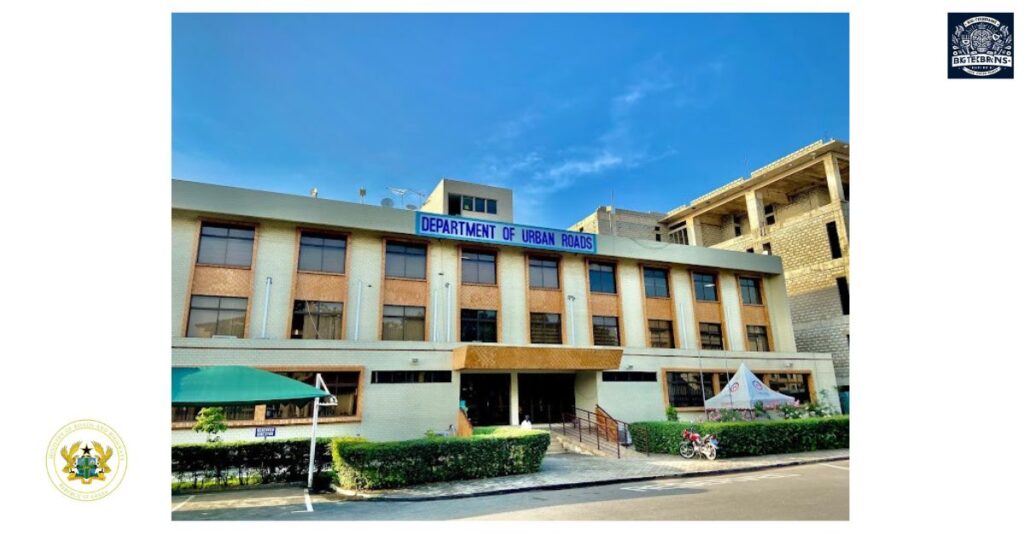Excerpt
The Department of Urban Roads (DUR) in Ghana plays a critical role in managing and developing the nation’s urban road network to enhance connectivity and economic growth. This article explores the historical development, constitutional framework, functions, leadership structure, and collaborative institutions that define the operations of the DUR.
Historical Overview
The Department of Urban Roads was established in 1988 under the Ministry of Roads and Highways (MRH). Its creation was part of Ghana’s broader effort to improve infrastructure development and urban mobility. Before its establishment, urban road development and maintenance were managed by local governments, which faced challenges due to inadequate resources and technical expertise.
The DUR was tasked with centralizing urban road management to ensure consistency, efficiency, and higher technical standards.
Constitutional and Legal Framework
The DUR operates under Ghana’s legal framework and derives its mandate from key legislations:
1992 Constitution of Ghana:
- Provides the general authority for the government to create and manage public institutions for infrastructure development.
Local Government Act, 2016 (Act 936):
- Outlines the role of the DUR in coordinating urban roads in collaboration with Metropolitan, Municipal, and District Assemblies (MMDAs).
Roads Act, 2003 (Act 540):
- Empowers the Ministry of Roads and Highways to oversee road infrastructure development.
National Development Planning Commission Act, 1994 (Act 479):
- Guides infrastructure planning within the context of national development goals.
Leadership and Method of Appointments
Director of Urban Roads:
- The DUR is led by a Director appointed by the President of Ghana in consultation with the Public Services Commission. The Director oversees policy implementation, budgeting, and project execution
Regional and District Engineers:
- These officials report to the Director and handle road projects at regional and district levels.
Offices and Institutions Working with DUR
The DUR collaborates with various governmental and private entities to execute its mandate:
Ministry of Roads and Highways (MRH):
- Provides overall policy direction.
Metropolitan, Municipal, and District Assemblies (MMDAs):
- Partner with DUR for urban road maintenance and planning.
Ghana Highway Authority (GHA):
- Focuses on trunk roads but works with DUR to integrate urban and inter-urban networks.
Department of Feeder Roads (DFR):
- Coordinates with DUR on road connectivity between urban centers and rural areas.
Private Contractors and Consultants:
- Engage in road construction, maintenance, and feasibility studies.
Functions and Roles
The DUR is responsible for the planning, construction, maintenance, and rehabilitation of urban roads. Key roles include:
Urban Road Network Development:
- Design and construct roads in urban centers.
Maintenance and Rehabilitation:
- Ensure roads remain in good condition to support mobility and economic activities.
Traffic Management:
- Implement traffic flow systems, including road markings, traffic lights, and signage.
Public Transport Integration:
- Facilitate urban transport planning to ensure efficient mass transit systems.
Safety Measures:
- Promote road safety initiatives, such as pedestrian walkways and speed bumps.
Operations
The DUR operates through a structured approach to ensure efficient road management:
Planning and Budgeting:
- Prepares annual work plans aligned with national development goals.
Project Execution:
- Collaborates with contractors and consultants for project delivery.
Monitoring and Evaluation:
- Ensures quality and timely completion of road projects.
Public Engagement:
- Involves communities in road development and maintenance programs
Overseers and Accountability
The DUR reports to:
Minister of Roads and Highways:
- Provides strategic oversight and policy guidance.
Parliament of Ghana:
- Reviews budgets and approves allocations for road projects.
National Development Planning Commission (NDPC):
- Ensures DUR’s projects align with national development priorities.]
References:
- 992 Constitution of Ghana
- Ministry of Roads and Highways official documents.
- Local Government Act, 2016 (Act 936).
- Roads Act, 2003 (Act 540).
- Publications from the National Development Planning Commission (NDPC).
- Reports and research papers on Ghana’s road infrastructure development.

